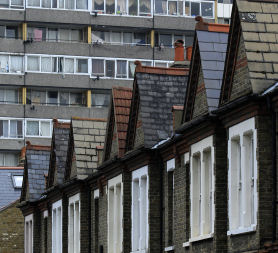Council housing: Ministers defend tenancy limits
Plans to limit council and housing tenancy agreements to as little as two years have been criticised by housing charities, who say it will be disincentive for social housing tenants to earn more.

The plans form part of a number of reforms outlined by Housing Minister Grant Shapps this morning. The social housing budget was slashed by spending cuts in the Spending Review last month.
The new system will end life tenancy for council and housing association homes, and will instead be offered fixed-term agreements for as little as two years. Tenants could be evicted from their homes after the fixed term if their financial circumstances have improved.
Mr Shapps said there has been a “lazy consensus” about social housing, with the number of people on waiting lists almost doubling over the past 13 years.
“This out-of-date approach has seen waiting lists rocket and is unfair to people who genuinely need social homes,” he said. “They trap existing tenants in poverty, often in homes that aren’t suitable for them.”
Minimum two-year agreement
He said he expected the length of tenancies to be between five and 20 years, but provision was made for a minimum two-year agreement. New tenants will be able to pass on the contract for their home to a spouse or partner when they die, but not to another family member who lived with them without the agreement of the landlord.
Mr Shapps said the new system will be “more flexible, with councils and housing associations able to offer fixed tenancies that give people the helping hand they need, when they need it.
“It’s difficult to imagine a more powerful disincentive to do well than the threat of losing your home if you start earning too much.”
David Orr, National Housing Federation
“But above all it will be fairer – councils will now be able to make decisions that genuinely meet the needs of local people, and the changes will not affect any existing tenants.”
The changes, which will only apply to new tenants in England, were also supported by Liberal Democrat Communities Minister Andrew Stunell, who said: “We need to have a much smarter system that protects lifetime tenancies, but also provides the flexibility to ensure that help is targeted at people who really need it, and enables us to get more for every pound of taxpayers’ money.”
But not all Lib Dems will agree with Mr Stunell, with cracks in the coalition already appearing over housing changes. When Prime Minister David Cameron suggested the move to fixed-term tenancies in August, the suggestion was dismissed by Lib Dem deputy leader Simon Hughes as not being the policy of his party or the coalition.
The plans were also condemned by Shelter, who called for the minimum tenancy to be increased to five years. Chief Executive Campbell Robb said the two-year limit showed “naivety” about how long it would take people to get back on their feet.
“The Government’s response to our affordable housing crisis, both through these policies and those we have already heard on cuts to housing benefit, social housing investment and legal aid, has seen the poorest and most vulnerable in society penalised again and again in what begins to feel like a deliberate attack,” he said.
David Orr, the chief executive of the National Housing Federation, said: “It’s difficult to imagine a more powerful disincentive to do well than the threat of losing your home if you start earning too much.”
Social Housing changes:
- Councils and housing associations to have the option to offer new tenants fixed-term agreements as short as two years.
- Councils to have more control over the rules on qualifying for waiting lists.
- Tenants can move across the country under a National Home Swap scheme.
- A new "affordable rents" tenancy will be available from next year, where landlords will be able to charge 80 per cent of local market rates, in a bid to raise money to build more housing.